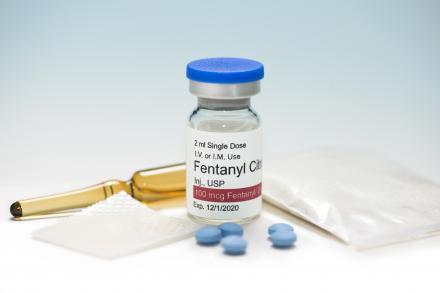Facts About Fentanyl

Facts about Fentanyl. Fentanyl is a synthetic opioid typically used to treat patients with chronic severe pain or severe pain following surgery. Fentanyl is a Schedule II controlled substance that is similar to morphine but about 100 times more potent. Under the supervision of a licensed medical professional, fentanyl has a legitimate medical use. Patients prescribed fentanyl should be monitored for potential misuse or abuse.
Illicit fentanyl, primarily manufactured in foreign clandestine labs and smuggled into the United States through Mexico, is being distributed across the country and sold on the illegal drug market. Fentanyl is being mixed in with other illicit drugs to increase the potency of the drug, sold as powders and nasal sprays, and increasingly pressed into pills made to look like legitimate prescription opioids. Because there is no official oversight or quality control, these counterfeit pills often contain lethal doses of fentanyl, with none of the promised drug.
There is significant risk that illegal drugs have been intentionally contaminated with fentanyl. Because of its potency and low cost, drug dealers have been mixing fentanyl with other drugs including heroin, methamphetamine, and cocaine, increasing the likelihood of a fatal interaction.
Producing illicit fentanyl is not an exact science. Two milligrams of fentanyl can be lethal depending on a person’s body size, tolerance and past usage. DEA analysis has found counterfeit pills ranging from .02 to 5.1 milligrams (more than twice the lethal dose) of fentanyl per tablet.
- 42% of pills tested for fentanyl contained at least 2 mg of fentanyl, considered a potentially lethal dose.
- Drug trafficking organizations typically distribute fentanyl by the kilogram. One kilogram of fentanyl has the potential to kill 500,000 people.
It is possible for someone to take a pill without knowing it contains fentanyl. It is also possible to take a pill knowing it contains fentanyl, but with no way of knowing if it contains a lethal dose.
According to the CDC, synthetic opioids (like fentanyl) are the primary driver of overdose deaths in the United States. Comparison between 12 months-ending January 31, 2020 and the 12 months-ending January 31, 2021 during this period:
- Overdose deaths involving opioids rose 38.1 percent.
- Overdose deaths involving synthetic opioids (primarily illicitly manufactured fentanyl) rose 55.6 percent and appear to be the primary driver of the increase in total drug overdose deaths.
Unless a drug is prescribed by a licensed medical professional and dispensed by a legitimate pharmacy, you can’t know if it’s fake or legitimate. And without laboratory testing, there’s no way to know the amount of fentanyl in an individual pill or how much may have been added to another drug. This is especially dangerous because of fentanyl’s potency.